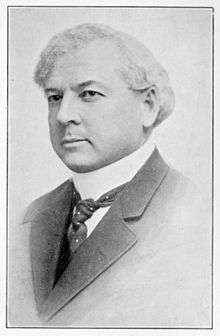Richard McBride
| Sir Richard McBride KCMG | |
|---|---|
 | |
| 16th Premier of British Columbia | |
|
In office June 1, 1903 – December 15, 1915 | |
| Monarch |
Edward VII George V |
| Lieutenant Governor |
Henri-Gustave Joly de Lotbinière James Dunsmuir Thomas Wilson Paterson Francis Stillman Barnard |
| Preceded by | Edward Gawler Prior |
| Succeeded by | William John Bowser |
| MLA for Westminster-Dewdney | |
|
In office July 9, 1898 – October 3, 1903 | |
| Preceded by | Colin Buchanan Sword |
| Succeeded by | district abolished |
| MLA for Dewdney | |
|
In office October 3, 1903 – November 25, 1909 | |
| Preceded by | first member |
| Succeeded by | William J. Manson |
| MLA for Yale | |
|
In office November 25, 1909 – March 28, 1912 | |
| Preceded by | Stuart Alexander Henderson |
| Succeeded by | Alexander Lucas |
| MLA for Victoria City | |
|
In office February 2, 1907 – December 15, 1915 Serving with Henry Frederick William Behnsen, Frederick Davey, Henry Broughton Thomson | |
| Preceded by |
William George Cameron Richard Low Drury Richard Hall James Dugald McNiven |
| Succeeded by | Harlan Carey Brewster |
| Personal details | |
| Born |
December 15, 1870 New Westminster, British Columbia |
| Died |
August 6, 1917 (aged 46) London, England |
| Nationality | Canadian |
| Political party | Conservative |
| Other political affiliations | Government |
| Spouse(s) | Christine Margaret McGillivray (m. 1896) |
| Children | 6 daughters |
| Alma mater | Schulich School of Law |
| Occupation | lawyer |
| Profession | politician |
| Cabinet | Minister of Mines (1900-1901) |
Sir Richard McBride, KCMG (December 15, 1870 – August 6, 1917) was a British Columbia politician and is often considered the founder of the British Columbia Conservative Party. McBride was first elected to the provincial legislature in the 1898 election, and served in the cabinet of James Dunsmuir from 1900 to 1901. McBride believed that the province's system of non-party government was unstable and hindered development. After the lieutenant-governor appointed him the 16th premier in June 1903 and McBride announced that his government was a Conservative Party administration and would contest the upcoming election along party lines. On October 3, 1903, McBride's party, the British Columbia Conservative Party won the first provincial election to be fought along party lines with a two-seat majority. McBride was also the first native-born Premier in British Columbia's history.
The new Conservative government attempted to stabilize the economy by cutting spending and raising new taxes. It also introduced progressive reforms of the province's labour law. In 1909 McBride unveiled plans for a provincial university and promised to build more railway lines. The party won commanding majorities in the 1909 and 1912 elections, almost shutting the Opposition out of the legislature.
McBride's Conservatives were aligned with the federal Conservatives of Robert Borden, and helped them take power in the 1911 federal election. On the first day of the First World War, the provincial government purchased and took possession of two submarines (HMCS CC-1 and HMCS CC-2) to defend the province from the threat of German attack. As provinces are not constitutionally allowed to maintain militaries, they were quickly transferred by order to the federal government within 48 hours and entered service with the Royal Canadian Navy in August 1914.[1]
His government was also responsible for the creation of the province's first university, the University of British Columbia, which opened its doors in 1915.
The government's popularity waned as an economic downturn hit the province along with the mounting railway debts. McBride resigned on December 15, 1915, to become the province's representative in London, where he died in 1917.
Richard McBride is interred in the Ross Bay Cemetery in Victoria, British Columbia.
Legacy
The small community of McBride, British Columbia was named after this premier during the time he was in office. Also named for the premier, the McBride River in northern British Columbia is a major tributary of the Stikine.
Sir Richard McBride Elementary School in Vancouver was named after him in 1911 during his tenure as Premier as well as McBride Park in Kitsilano on July 26, 1911.( During World War I the park was used for the cultivation of vegetables.)
Also named for him is McBride Boulevard in New Westminster which is the western ramp for the Pattullo Bridge.
See also
References
External links
- Works by or about Richard McBride at Internet Archive
- Biography at the Dictionary of Canadian Biography Online
- British Columbia: From the Earliest Times to the Present, Vol IV (Biographical) by E.O.S. Scholefield and F.W. Howay (see pp. 5-6).